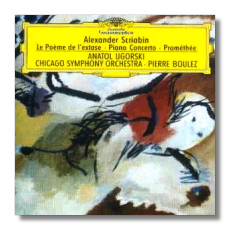
The Internet's Premier Classical Music Source
Related Links
- Scriabin Reviews
- Latest Reviews
- More Reviews
-
By Composer
-
Collections
DVD & Blu-ray
Books
Concert Reviews
Articles/Interviews
Software
Audio
Search Amazon
Recommended Links
Site News
 CD Review
CD Review
Alexander Scriabin

Poems of Fire & Ecstasy
- Poem of Ecstasy
- Piano Concerto
- Prometheus (Poem of Fire)
Anatol Ugorski, piano
Chicago Symphony Orchestra & Chorus/Pierre Boulez
Deutsche Grammophon 459647-2 DDD 72:14
When it comes to Scriabin, cool and precise Pierre Boulez is not the first conductor I would have thought of. Nevertheless, this recording is a triumph through and through, not least because it has sold me on music that I have tended to undervalue in the past.
The Piano Concerto, written when the composer was only 24, is a notoriously difficult work to bring off. It uses words and phrases from the Romantic vocabulary of Rachmaninoff and Chopin, but it avoids both display and the Romantic concerto's tendency to stir up drama through the tension between struggle and victory. Instead, Scriabin's concerto is pretty, masculine, and content simply to occupy a moment in time. Piano and orchestra co-exist in harmony, as it were, and there is no sense of competition. This was not clear to me until hearing Ugorski and Boulez; now this concerto has become a fascinating work. Ugorski spins out the Chopinesque filigree with manly grace, and his playing is colorful and imaginative. Boulez and the Chicagoans complement it perfectly. This is the best version I know, far better than Ashkenazy's, and even better than Solomon's.
Prometheus, a much later work, can pointlessly discursive. Dimitri Mitropoulos and the New York Philharmonic made something good of it 40 years ago, but it too is elusive. Boulez's coolness is welcome. He does not allow the orchestra to bathe in its own sound; he keeps the textures open and the interpretation objective, ratcheting up the tension at the end at the entry of the wordless chorus. Scriabin envisioned this work being played with a "color organ" that would project vivid hues into the performance space. Such an instrument is hardly necessary here, given Boulez's vivid musicianship.
Poem of Ecstasy is the most familiar of these three works. While it is tempting to play it as an erotic showpiece, that approach is cheap and easy. Boulez's unforced reading smells like the stars, not like the boudoir. This is one work in which throwing caution to the winds has only disastrous results, and Boulez wisely keeps control over color and pace.
These are great performances, then. The engineering is not quite ideal - the recordings made in Orchestra Hall (the Piano Concerto and Prometheus) are not as open as Poem of Ecstasy, which Deutsche Grammophon recorded in Medinah Temple.
Copyright © 1999, Raymond Tuttle


















